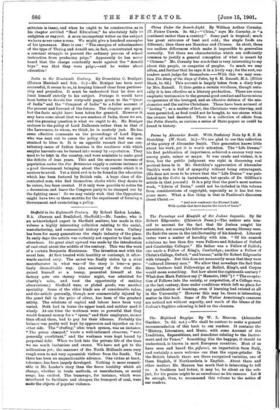Sheffield in the Eighteenth Century. By Robert Emden Leader, B.A.
(Pawson and Brailsford, Sheffield.)—Mr. Leader, who is an acknowledged expert in Sheffield matters, has made in this volume a highly interesting collection relating to the social, manufacturing, and commercial history of the town. Cutlery has been for many generations the staple industry of the place. In early days the article was certainly not superior to that made elsewhere. Its great start upward was made by the introduction of cast-steel about the middle of the century. This was the work of a certain Benjamin Huntsman. The invention met with the usual fate. At first treated with hostility or contempt, it after- wards excited envy. The secret was finally stolen by a rival manufacturer in what was—if the story is true—a pecu- liarly discreditable way. (An emissary of the rival dis- guised himself as a tramp, presented himself at the factory gate one stormy winter night, was admitted for charity's sake, and took the opportunity of making observations.) Sheffield ware, or plated goods, was another speciality. Some of the older kinds are of considerable value, and the article generally, though now commercially injured by the great fall in the price of silver, has been of the greatest utility. The relations of capital and labour have been very varied. Both had in turns the upper hand, and neither used it wisely. At one time the workmen were so powerful that they would demand money for a " spree," and their employers, sooner than offend them, had to pay for their idleness. Probably the balance was pretty well kept by oppression and injustice on the other side. The "stuffing," alias truck system, was an instance. "The prices charged," wrote a well-informed observer, " wer3 generally exorbitant," and the workmen were kept bound by perpetual debt. When we Iook into the private life of the time we see much barbarism and excess. We have not got to the millennium yet ; the manners of the North Midlands seem very rough even to not very squeamish visitors from the South. Yet there has been an unquestionable advance. One virtue at least, tolerance, has been largely developed. Nothing is more remark- able in Mr. Leader's story than the fierce hostility which all change, whether in trade methods, or manufacture, or social usage, has excited. The tramways, for instance, which were introduced to facilitate and cheapen the transport of coal, were made the objects of popular violence.










































 Previous page
Previous page